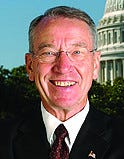Senators Seek Ethical Makeover for Device Industry
March 1, 2009
NEWS TRENDS
Click to enlarge |
The Physician Payment Sunshine Act, spearheaded by Grassley, could result in hefty fines for device makers for improper payments to physicians. |
Fresh off the heels of AdvaMed's release of its updated code of ethics, two congressmen have introduced a bill on ethics. The bill would require manufacturers and group purchasing organizations to disclose any payments to physicians valued at $100 or more.
The Physician Payments Sunshine Act, initiated by Senators Charles Grassley (R–IA) and Herb Kohl (D–WI), would require drug and device manufacturers to disclose such payments to HHS and list them on a federal Web site. Along with payment amounts, information such as doctors' names and whether they are consultants, lecturers, or trainers for a device firm would also be disclosed. Physicians could contest reports listed in the database, which HHS staff would review and then make a determination.
AdvaMed supports federal disclosure legislation because it would create a uniform standard for all 50 states. The group has not yet finished reviewing the bill but signaled that it could not endorse it wholeheartedly. “As we review this legislation, we also will be mindful of the unique needs of medical device companies, many of whom are small businesses that may lack the resources to meet the administrative requirements set forth in the bill,” said AdvaMed president Stephen Ubl in a statement.
Potential Penalties by the Numbers
|
The senators introduced a previous version of the bill last year, which would have required disclosure on any payments over $25. Although the earlier version didn't pass, Kohl says it made progress in terms of gaining support on the principle. “Since we first introduced the bill, there has been a groundswell of support from every corner,” Kohl says. “Patients want to know that they can fully trust the relationship they have with their doctor.”
Pressure from lawmakers has prompted groups on both sides of the industry-physician line to take a preemptive approach. In December, cardiovascular device maker Edwards Lifesciences announced that it would voluntarily disclose its relationships with doctors in 2009. Orthopedic firm Smith & Nephew told its executives and sales staff to avoid interacting with doctors after official conference hours at the annual meeting of the American Academy rthopedic Surgeons in February. On the other side, the North American Spine Society, which represents U.S. spine surgeons, has made it mandatory for its members to disclose—down to dollar amounts—any financial ties to medical device firms.
In the meantime, several states already have laws that necessitate disclosure of financial ties between industry and physicians. The most recent state to pass such a law is Massachusetts, whose law became effective January 1, 2009. Similar disclosure laws exist in California, Vermont, Minnesota, and Nevada, among other states. If passed, the Physician Payments Sunshine Act would preempt state laws that call for the disclosure of money and gifts to physicians. Copyright ©2009 Medical Device & Diagnostic Industry
About the Author(s)
You May Also Like


.png?width=300&auto=webp&quality=80&disable=upscale)
